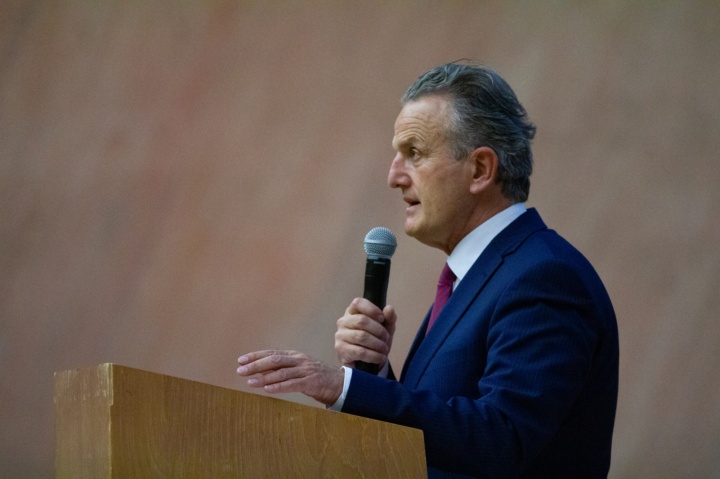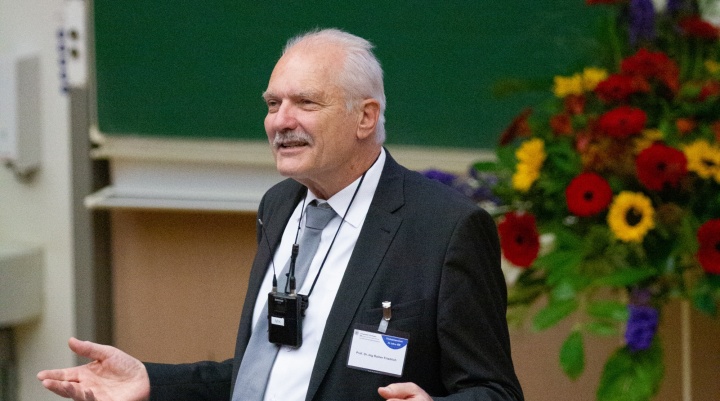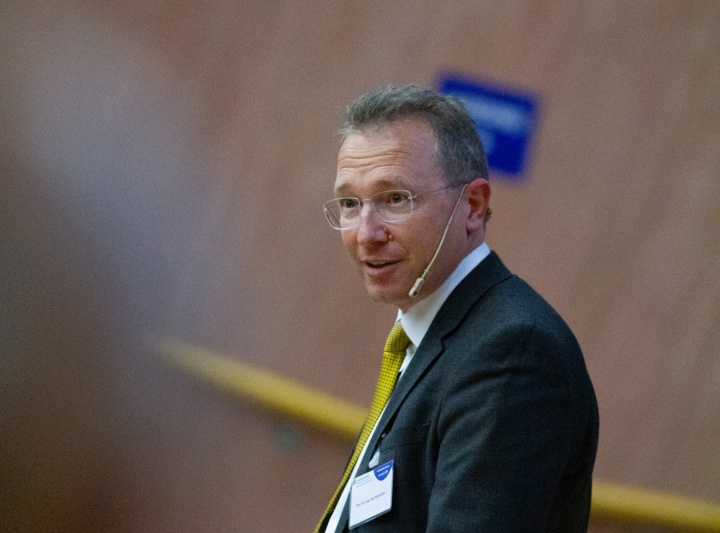
“Having people in the lecture hall again – that feels good”, said a happy Prof. Kai Hufendiek, Head of the IER, when welcoming the guests. This was all the more true, because as well as celebrating 31 years of the IER it was also the long-postponed opportunity to say goodbye to Prof. Rainer Friedrich, who before retiring was Head of the Department for Technology Assessment and the Environment at the IER.
Both national and international fame
As well as reunification and winning the soccer World Cup, another special event in Germany in 1990 was the founding of the IER, highlighted the Mayor of Stuttgart Dr. Frank Nopper, who spoke of it being a “quantum leap”. The research profile relating to alternative energies and drive systems, emissions, immissions as well as the rational use of energy has produced some genuine innovations and brought the IER both national and international fame. Nopper gave thanks for the excellent research and fruitful collaboration with the city of Stuttgart.
As relevant as ever: technology assessment
The Vice Rector of the University of Stuttgart, Prof. Silke Wieprecht, passed on the greetings from the Rectorate: “The IER has significantly enhanced the research carried out by the University of Stuttgart at the Department of Energy Technology and beyond, and has consistently provided clearly visible boosts to energy and climate policy. At the same time, she thanked Rainer Friedrich for having had a lasting impact on teaching and research at the institute. Wieprecht said that Friedrich had helped the IER achieve recognition both in Stuttgart and beyond with highly relevant topics such as technology assessment and air pollution control, as well as through his position as coordinator of a number of EU research projects.
Help in making the best decisions
In his goodbye speech, Friedrich focused on the research into technology assessment and air pollution control carried out at the IER over the last 30 years. “The purpose of technology assessment is to help decision-makers make the best decisions”, he explained, and reminisced about his time as a doctoral student, which he dedicated to questions relating to the costs and improved functioning of new technologies. Questions such as air pollution, the effects of climate change, energy security, resources and the risk of accidents only came later. The problem with technology assessment, says Friedrich, is that so many different criteria have to be taken into account when making a decision.
Both technical systems and political measures can be assessed using the impact pathway analysis developed by Rainer Friedrich, which has been used frequently since. With regard to the damage to health caused by air pollutants, which was a particular focus of his research, Friedrich explained by way of example that you can’t forget the air pollutants in indoor spaces, which accumulate in rooms with thermally insulated windows in particular. Friedrich believes that deposits from rails, wheels, road surfaces etc. wearing out will be a major issue in the future.
Hydrogen – a very special substance
The other two speeches both focused on the issue of hydrogen. Hydrogen is increasingly in demand from industry, the transport sector as well as local power and heat generators, said Kurt Wagemann, executive director of DECHEMA. Today, however, hydrogen is now mostly produced from fossil fuels. From a climate neutrality point of view, hydrogen production is only climate-neutral when the energy is stored or reused, emphasized Wagemann. With this in mind, Wagemann demonstrated some possible ways that chemical production in Germany could be made carbon-neutral.
The Head of the IER, Prof. Kai Hufendiek, talked about the role of hydrogen in a climate-neutral energy system and what a system of this kind could look like in Germany by 2045. Based on the latest results from analyses of energy systems, Hufendiek explained that as well as electrolytic processes to produce green hydrogen, hydrogen production based on biomass also has an important role to play, as do imports. “There is an urgent need for action”, stressed Kai Hufendiek, saying that research and development in particular need to be stepped up further and preparations carried out for the market launch. There are still too many uncertainties at present with regard to the technical opportunities and potential before any important decisions can be taken, for example with regard to the transport and distribution infrastructure.




